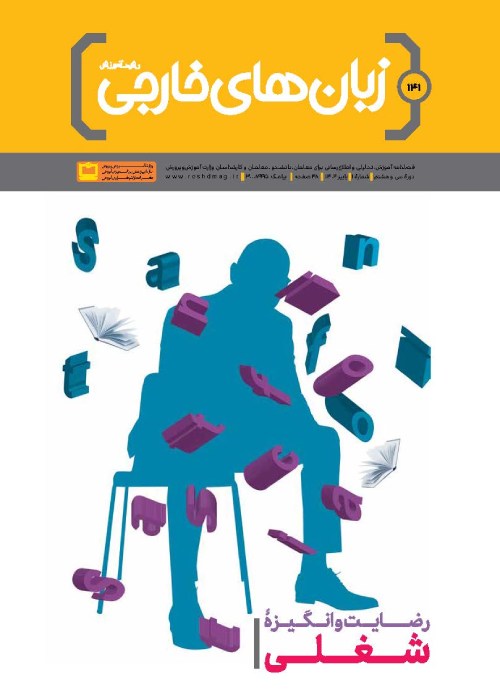فهرست مطالب

نشریه رشد آموزش زبان های خارجی
پیاپی 141 (پاییز 1402)
- تاریخ انتشار: 1402/09/30
- تعداد عناوین: 12
- سخن سردبیر
-
صفحات 2-3
- رشد حرفه ای معلم
-
صفحات 4-7
- مصاحبه و رویداد
-
بررسی عوامل اثرگذار و چگونگی گذر از چالش ها / گفت و گو با دکتر محمد امینی فارسانیصفحات 8-13
- پژوهش
-
Pages 1-5
atisfaction are two important variables affecting teachers’ performance and effectiveness. Many studies have focused on the relationship or the effect of professional development with or on teachers’ job satisfaction. Few studies have also studied the effects of teachers’ job satisfaction on their professional development practices and activities. These studies show that there is a two-sided, bidirectional relationship between professional development and job satisfaction, which means that the two affect each other and are dependent on each other. In this regard, the self-initiated sense of professional development can create levels of job satisfaction that are under the control of teachers, independent of any external factor. After discussing these two concepts, the present article highlights the strategy for achieving such satisfaction.
Keywords: professional development, job satisfaction, professionalism, effectiveness, external factors -
Pages 6-12
profession. Foreign language teachers usually experience different types of tensions ranging from bulky instructional materials, inflexible working hours, low pay, and rigid curriculum to heterogeneous students. When not attended to, each of these factors can negatively affect teacher efficacy and satisfaction. While many would argue that these points are usually beyond the control of a simple classroom teacher, there are remedial strategies that canbe applied by teachers to change classroom atmosphere, enhance learner engagement, and positively contribute to teachers’ sense of satisfaction. One of these strategies involves using digital technologies, namely game elements and online learning platforms, to generate teaching/learning activities and tasks. Although teachers might not always have the control over the materials they use to teach a language, they can draw on relevant development tools to create more engaging learning activities. This can further enhance learner motivation to follow instruction and get engaged in practice. In a motivating teaching/learning context, teachers are expected to be more satisfied with all the attempts they put into instruction. The present article discusses different approaches toward gamifying activities and using online spaces to generate them to achieve the above-mentioned goals.
Keywords: gamification, learning activities, teacher satisfaction, materialsdevelopment, classroom atmosphere -
Pages 13-16
to produce a coherent piece of text with correctly chosen and spelled words usually lags behind their general language proficiency. Unlike writing skill that requires specific pedagogical strategies and practice, spelling skill can be developed in a more straightforward way by means of digital technologies. Smartphone apps are good examples of educational tools that can be applied for spelling practice in a foreign language. Such practice which is usually offered in the form of games can engage learners in the process of knowledge construction and, in effect, be more productive for language learners at different levels of language proficiency. Students have the opportunity to play these spelling games individually or in groups and receive automated feedback from the system. This increases the applicability of these games for self-study. The present article introduces three app-based spelling games and reviews their applicability for English word spelling practice. Introducing these games to students, teachers can motivate learners to play a more active role in the process of learning and extend the instructional/learning time beyond the confines of the physical classrooms
Keywords: games, spelling errors, foreign language, smartphone apps, writing ability -
Pages 17-20
La satisfaction professionnelle est une exigence pour la performance professionnelle de l'enseignant, ce qui est souvent négligé et sous-estimé dans le domaine de l'éducation. Néanmoins, non seulement cela a une relation directe avec le niveau de motivation et l’enthousiasme fourni à l’apprenant, mais aussi, il est bien lié avec la qualité d’enseignement et d’engagement. Le présent article tente d’identifier les facteurs qui favorisent la satisfaction ou l’insatisfaction des enseignants de FLE dans les instituts de langues en Iran
Keywords: Satisfaction professionnelle, Enseignant, FLE, Iran, motivation -
Pages 21-23
-
Pages 24-26
-
Pages 28-29

